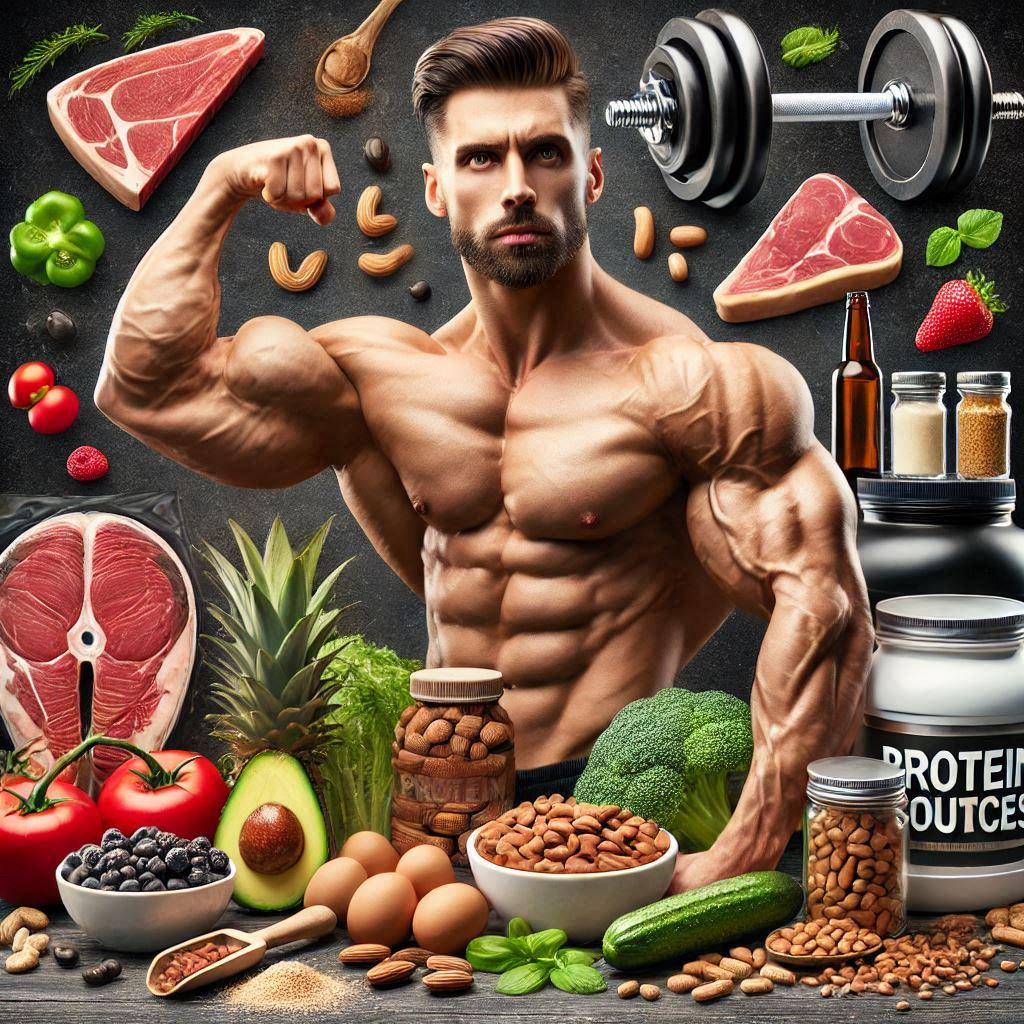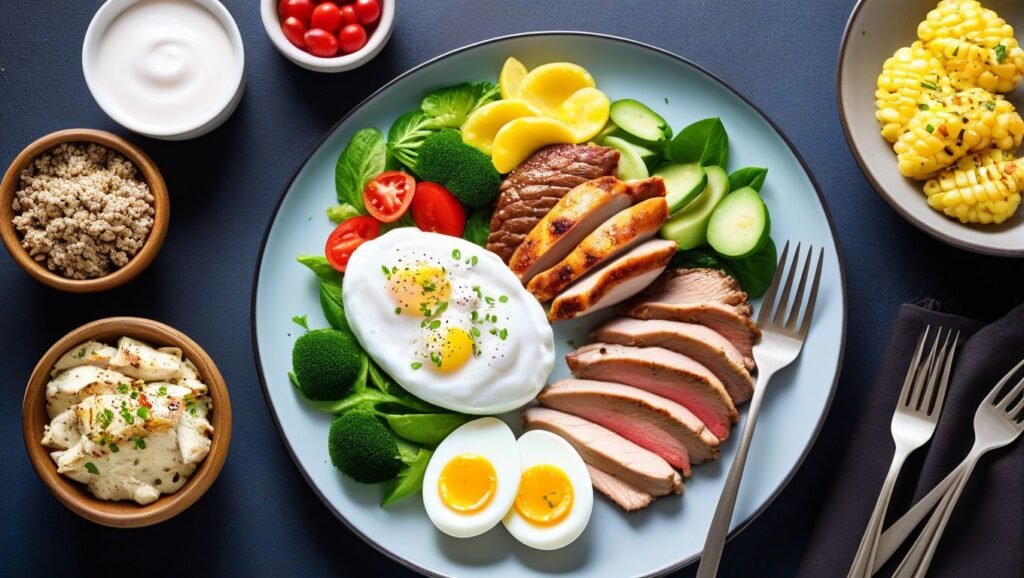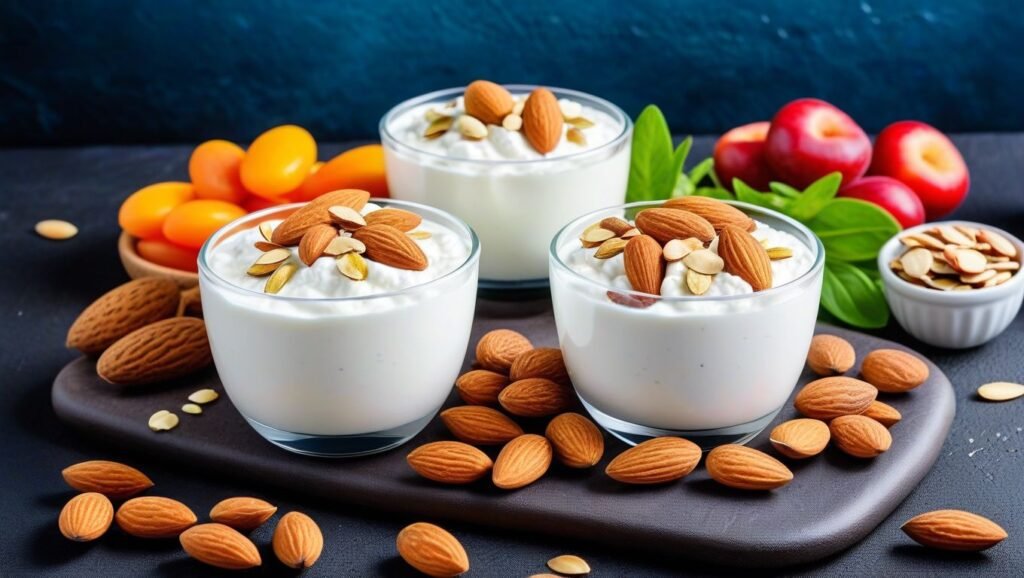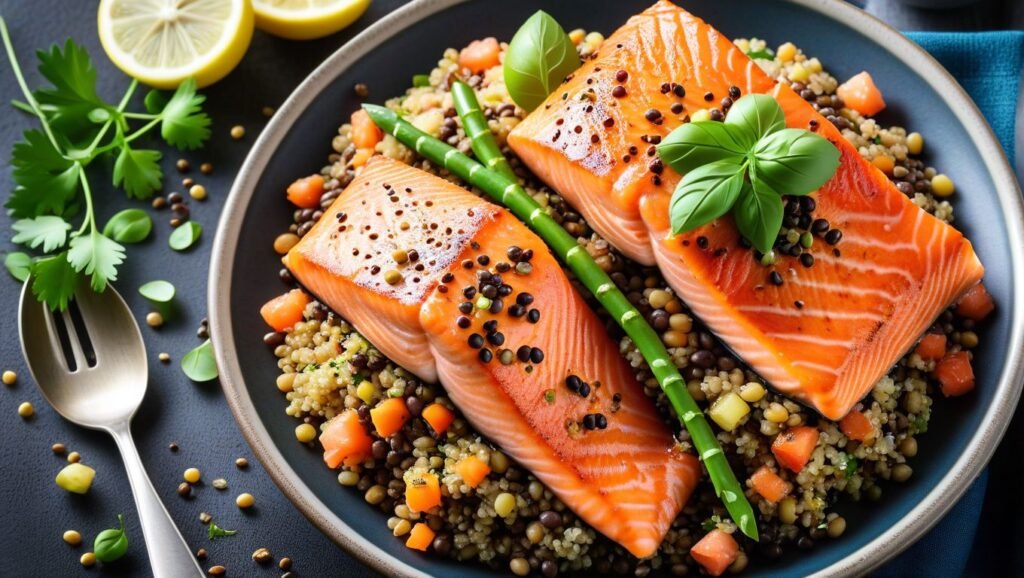“10 Best Protein Sources for Muscle Growth”
10 Best Protein Sources for Optimal Muscle Growth
Discover top protein sources to enhance muscle growth and support your fitness journey effectively.


Introduction
Importance of Protein for Muscle Growth
Protein is essential for muscle growth and repair. It provides the building blocks (amino acids) that your body needs to create new muscle tissue. Consuming adequate protein helps to increase muscle mass, improve strength, and enhance recovery after workouts. For those engaged in regular physical activity or strength training, ensuring sufficient protein intake is crucial for achieving optimal results.
Overview of the Best Protein Sources
There are numerous protein sources available, each with its own unique benefits. The best protein sources are those that provide high-quality protein, essential amino acids, and additional nutrients that support overall health. Here, we will explore some of the top protein sources that can help you achieve your muscle growth goals.

Protein Source 1: Chicken Breast
High Protein Content
Chicken breast is a popular protein source among athletes and fitness enthusiasts due to its high protein content and low fat. A 100-gram serving of cooked chicken breast provides approximately 31 grams of protein, making it an excellent choice for muscle building. The protein in chicken breast is complete, meaning it contains all the essential amino acids required for muscle repair and growth.
Low Fat and Versatile in Recipes
Chicken breast is also low in fat, with only about 3.6 grams of fat per 100 grams. This makes it a lean protein option that can be easily incorporated into a variety of dishes. Whether grilled, baked, or sautéd, chicken breast can be used in salads, sandwiches, stir-fries, and more. Its mild flavor allows it to pair well with different seasonings and ingredients, making it a versatile addition to your diet.
Protein Source 2: Eggs
Complete Protein with All Essential Amino Acids
Eggs are one of the most nutritious foods available and are considered a complete protein source. Each egg contains about 6 grams of high-quality protein, including all nine essential amino acids that the body cannot produce on its own. These amino acids are crucial for muscle repair and growth, making eggs an excellent choice for those looking to build muscle.
Benefits of Egg Whites and Yolks
Both the egg whites and yolks offer unique benefits. Egg whites are low in calories and fat, providing a concentrated source of protein. On the other hand, egg yolks contain essential nutrients such as vitamins A, D, E, and B12, as well as healthy fats and antioxidants like lutein and zeaxanthin. Including whole eggs in your diet ensures you get the full range of nutrients that support muscle growth and overall health.

Protein Source 3: Greek Yogurt
High Protein and Probiotics
Greek yogurt is a protein-rich dairy product that is also packed with probiotics, which are beneficial bacteria that support gut health. A 200-gram serving of Greek yogurt can provide up to 20 grams of protein, making it an excellent option for muscle building. The protein in Greek yogurt is primarily casein, which is a slow-digesting protein that provides a steady release of amino acids to the muscles.
Ideal for Snacks and Smoothies
Greek yogurt is versatile and can be enjoyed in various ways. It makes a convenient and nutritious snack on its own or can be paired with fruits, nuts, and honey for added flavor and nutrients. Greek yogurt can also be blended into smoothies to boost their protein content. Its creamy texture and tangy flavor make it a delicious addition to both sweet and savory dishes.
Read also: 14 Best Foods to Lower Blood Sugar Effectively
Protein Source 4: Lean Beef
Rich in Protein and Iron
Lean beef is an excellent source of high-quality protein and essential nutrients like iron. A 100-gram serving of lean beef provides approximately 26 grams of protein, making it a great option for muscle growth. The iron in lean beef is heme iron, which is more easily absorbed by the body compared to non-heme iron found in plant-based sources. Iron is crucial for oxygen transport in the blood and energy production, both of which are important for muscle function and overall performance.
Benefits of Lean Cuts for Muscle Building
Choosing lean cuts of beef, such as sirloin, tenderloin, or round steak, ensures you get the protein benefits without excessive saturated fat. Lean beef is also rich in other essential nutrients like zinc, vitamin B12, and creatine, which support muscle growth, repair, and overall health. Incorporating lean beef into your diet can help you meet your protein needs and enhance your muscle-building efforts.
Protein Source 5: Fish (Salmon, Tuna)
High-Quality Protein and Omega-3 Fatty Acids
Fish, particularly fatty fish like salmon and tuna, are excellent sources of high-quality protein and omega-3 fatty acids. A 100-gram serving of salmon provides about 20 grams of protein, while the same amount of tuna offers around 25 grams of protein. Omega-3 fatty acids, found abundantly in these fish, have anti-inflammatory properties and support heart health.
Benefits for Muscle Recovery and Overall Health
The combination of protein and omega-3 fatty acids in fish makes it an ideal food for muscle recovery and overall health. Omega-3s help reduce muscle soreness and inflammation after intense workouts, promoting faster recovery. Additionally, the high protein content supports muscle repair and growth. Including fish like salmon and tuna in your diet can enhance your muscle-building efforts and provide numerous health benefits.
Protein Source 6: Cottage Cheese
Casein Protein for Slow Digestion
Cottage cheese is a dairy product rich in casein protein, which is a slow-digesting protein that provides a steady release of amino acids to the muscles. A 100-gram serving of cottage cheese contains approximately 11 grams of protein. The slow digestion of casein makes it an excellent option for nighttime snacks, as it helps sustain muscle protein synthesis during sleep.
Ideal for Nighttime Snacks
Cottage cheese is not only high in protein but also low in fat and calories, making it a nutritious and satisfying snack. It can be enjoyed on its own or paired with fruits, nuts, or honey for added flavor and nutrients. Consuming cottage cheese before bed can help prevent muscle breakdown overnight and support muscle growth and recovery.
Protein Source 7: Whey Protein
Fast-Digesting Protein Supplement
Whey protein is a popular protein supplement derived from milk. It is a fast-digesting protein that is quickly absorbed by the body, making it ideal for post-workout recovery. Whey protein is available in various forms, including whey protein concentrate, isolate, and hydrolysate, each with different protein content and processing methods.
Benefits for Post-Workout Recovery
Consuming whey protein after a workout helps replenish amino acids in the muscles, promoting muscle repair and growth. It is rich in branched-chain amino acids (BCAAs), particularly leucine, which plays a key role in stimulating muscle protein synthesis. Whey protein supplements are convenient and can be easily mixed with water, milk, or smoothies for a quick and effective post-workout protein boost.
Protein Source 8: Lentils
Plant-Based Protein and Fiber
Lentils are an excellent source of plant-based protein and fiber, making them a great option for vegetarians and vegans. A 100-gram serving of cooked lentils provides approximately 9 grams of protein and 8 grams of fiber. The high fiber content helps slow down the digestion and absorption of carbohydrates, leading to more stable blood sugar levels and sustained energy.
Benefits for Vegetarians and Vegans
Lentils are rich in essential nutrients such as iron, folate, and magnesium, which are important for overall health. They are also versatile and can be used in a variety of dishes, including soups, stews, salads, and curries. For vegetarians and vegans, lentils provide a valuable source of protein that supports muscle growth and repair.
Protein Source 9: Quinoa
Complete Plant-Based Protein
Quinoa is one of the few plant-based foods that provide a complete protein, meaning it contains all nine essential amino acids. A 100-gram serving of cooked quinoa offers about 4 grams of protein. This makes quinoa an excellent choice for those looking to increase their protein intake without consuming animal products.
Versatile in Various Dishes
Quinoa is highly versatile and can be used in a wide range of dishes, from salads and grain bowls to soups and breakfast porridges. Its mild, nutty flavor pairs well with both savory and sweet ingredients, making it a flexible addition to any meal. Quinoa is also rich in fiber, vitamins, and minerals, supporting overall health and well-being.
Protein Source 10: Almonds
Protein and Healthy Fats
Almonds are a nutritious snack that provides a good amount of protein and healthy fats. A 28-gram serving (about 23 almonds) contains approximately 6 grams of protein and 14 grams of healthy fats. The healthy fats in almonds, primarily monounsaturated fats, support heart health and provide sustained energy.
Ideal for Snacks and Adding to Meals
Almonds are convenient and portable, making them an ideal snack for on-the-go. They can also be added to a variety of dishes, such as salads, oatmeal, yogurt, and baked goods, to boost their protein content. Additionally, almonds are rich in vitamin E, magnesium, and antioxidants, which contribute to overall health.
Conclusion
Recap of the Best Protein Sources for Muscle Growth
Incorporating a variety of high-quality protein sources into your diet is essential for muscle growth and overall health. The best protein sources for muscle growth include:
- Chicken Breast
- Eggs
- Greek Yogurt
- Lean Beef
- Fish (Salmon, Tuna)
- Cottage Cheese
- Whey Protein
- Lentils
- Quinoa
- Almonds
Encouragement to Incorporate These Sources into Your Diet
By including these protein-rich foods in your meals, you can effectively support muscle growth, enhance recovery, and improve overall health. Experiment with different recipes and combinations to keep your diet interesting and enjoyable. Remember, consistency is key to achieving your fitness goals.
Final Thoughts on the Importance of a Balanced Diet for Muscle Building
A balanced diet that includes a variety of protein sources, along with carbohydrates, healthy fats, vitamins, and minerals, is crucial for optimal muscle building and overall health. Ensuring you get enough protein from diverse sources helps provide all the essential amino acids your body needs for muscle repair and growth. Additionally, a balanced diet supports energy levels, immune function, and overall well-being. Embrace a holistic approach to nutrition and enjoy the benefits of a healthier, stronger body.


Post Comment